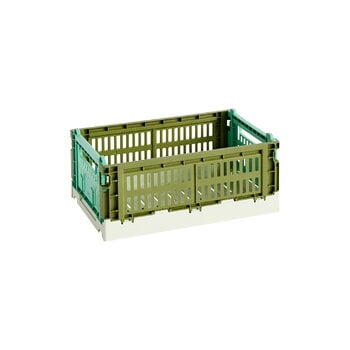Reduce Waste and Save Costs With Made Use Of Plastic Containers for Recycling
In today's organization landscape, the focus on sustainability and cost-effectiveness has never been even more critical. One avenue that firms are significantly discovering is the usage of used plastic containers for recycling. Beyond the obvious ecological benefits, such efforts can cause substantial cost savings and functional performances. By embracing a calculated approach to reusing plastic packaging, companies can not only add to a cleaner earth however also improve their resource use and profits (used bulk plastic containers). The potential of repurposing plastic containers goes much past simply waste reduction; it offers an engaging chance for companies to straighten their functional practices with an extra sustainable future.
Environmental Benefits of Reusing Containers
Recycling plastic containers considerably lowers waste and adds to environmental sustainability by reducing the need for brand-new plastic production. By extending the lifespan of plastic containers through reuse, less resources are needed for production, which consequently leads to lower power intake and greenhouse gas emissions linked with manufacturing processes. Additionally, reusing plastic containers aids divert them from land fills or incineration, reducing the environmental impact of plastic waste disposal.
This method also plays an essential duty in preserving natural resources like oil, which is a main part in plastic production. By reusing containers, much less virgin plastic requires to be manufactured, ultimately preserving valuable fossil gas books. Moreover, reusing plastic containers advertises the idea of a round economic climate, where products are maintained in usage for as lengthy as possible, minimizing the overall environmental footprint of plastic product packaging. Generally, the environmental advantages of reusing plastic containers are considerable and line up with lasting waste monitoring techniques.

Expense Financial Savings Through Reusing Initiatives
Executing reusing efforts for utilized plastic containers can result in significant cost financial savings for services and communities alike. By integrating a structured recycling program, companies can minimize expenditures related to acquiring new containers while likewise minimizing waste disposal expenses. Reusing plastic containers through recycling campaigns eliminates the demand for constant substitutes, bring about long-lasting savings on procurement expenses. Furthermore, reusing minimizes the volume of waste sent to land fills, thereby lowering landfill fees and possible fines for going beyond waste limitations.
Expense cost savings extend beyond procurement and waste monitoring, as reusing utilized plastic containers can likewise add to a positive brand picture. Customers are progressively favoring eco-conscious organizations, and showcasing a dedication to sustainability with reusing initiatives can boost a company's credibility and draw in ecologically conscious consumers. Moreover, some regions provide rewards or tax benefits for organizations that proactively take part in reusing programs, offering extra cost-saving chances. Inevitably, buying recycling initiatives for plastic containers not only benefits the environment however likewise uses concrete economic benefits for communities and organizations.
Tips for Appropriately Cleaning Up Utilized Containers


Vacant and Rinse: Prior to reusing, clear the containers of any kind of remaining food or liquids. Wash them with water to get rid of deposit and protect against smells.
Usage Warm Water and Soap: Wash containers with warm water and soap. This aids to eliminate oil, oils, and stubborn food particles. Consider making use of a bottle brush for hard-to-reach locations.
Prevent Extreme Chemicals: While it is very important to clean thoroughly, stay clear of making use of rough chemicals that might contaminate the plastic. Adhere to mild recipe soap to ensure the containers stay secure for reusing.
Air Dry: After cleaning, permit the containers to air dry entirely before keeping or recycling them. This helps avoid the development of mold and germs.
Imaginative Ways to Repurpose Plastic Product Packaging
One sensible technique is to use plastic containers as storage space services for arranging tiny items such as craft supplies, hardware, or office devices. By repurposing plastic product packaging in this way, not just are the containers maintained out of landfills, however they also serve a useful role in maintaining a well organized space.
An additional innovative method to repurpose plastic packaging is by transforming it right into planters for little herbs or interior plants. With a few drain holes included in the bottom, plastic containers can be easily upcycled right into pots for greenery, including a touch of sustainability to home decoration. In addition, plastic packaging can be utilized in arts and crafts jobs, acting as product for creating special sculptures, coordinators, or even fashion jewelry. By assuming creatively regarding the possible uses plastic product packaging, individuals can contribute to minimizing waste while taking part in useful and green techniques.
Neighborhood Effect of Recycling Programs
The practice of artistically repurposing plastic product packaging not only promotes sustainability on an individual degree yet additionally plays a considerable role fit the community effect of reusing programs. When neighborhoods accept reusing efforts that include the reuse of plastic containers, they add to a cleaner atmosphere and an extra sustainable future. By encouraging locals to join reusing programs that entail repurposing used plastic containers, neighborhoods can reduce the amount of waste recycled plastic containers sent out to landfills, preserve resources, and minimize their carbon footprint.
Additionally, the community impact of recycling programs extends past environmental benefits. It promotes a feeling of collective duty and a shared commitment to preserving the world for future generations. Reusing campaigns that use used plastic containers can additionally create chances for area engagement, cooperation, and education. As people collaborated to support reusing efforts, they not only add to a much healthier setting but additionally enhance the social material of their neighborhood. Inevitably, recycling programs that integrate the repurposing of plastic packaging have the potential to motivate favorable modification and promote a much more sustainable lifestyle.

Final Thought
In verdict, utilizing used plastic containers for recycling offers environmental benefits by decreasing waste and saving resources. Correctly cleansing and repurposing plastic product packaging can better expand the life-span of these containers.
One avenue that business are progressively checking out is the use of utilized plastic containers for reusing.Recycling plastic containers dramatically reduces waste and adds to environmental sustainability by lowering the demand for brand-new plastic manufacturing. Furthermore, reusing plastic containers assists divert them from land fills or incineration, minimizing the environmental influence of plastic waste disposal.
Reusing plastic containers promotes the idea of a round economic climate, where materials are maintained in use for as lengthy as feasible, minimizing the general ecological footprint of plastic product packaging. By urging homeowners to get involved in recycling programs that involve repurposing utilized plastic containers, areas can lower the quantity of waste sent out to landfills, conserve sources, and lessen their carbon impact.